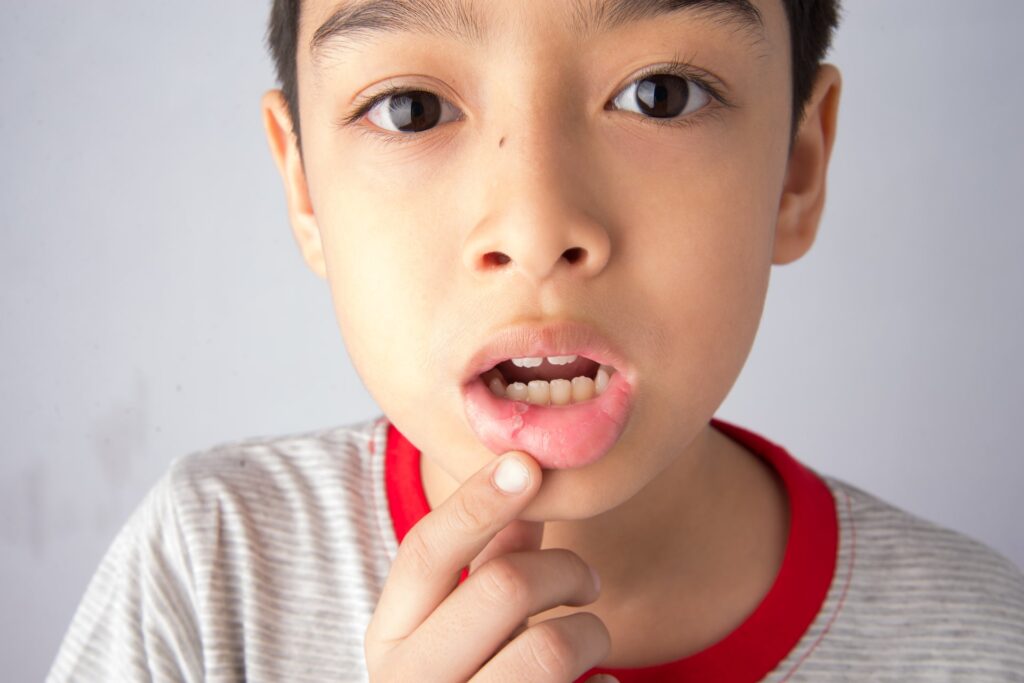Why Does My Child Have Canker Sores?

Canker sores are common in children. Although they are usually nothing to worry about, if you’ve ever had one, you likely know that they can cause a lot of discomfort. In this article, we will address the following commonly asked questions:
- What Are Canker Sores?
- What Causes Canker Sores in A Child’s Mouth?
- How to Treat a Child’s Canker Sore
What Are Canker Sores?
Canker sores – also known as aphthous ulcers – are small, round, painful sores with a red border and a white, yellow or gray center. Aphthous ulcers form on the soft tissues inside the mouth, including the inside of a child’s cheeks, the inside of the lips, the floor of the mouth and the underside of the tongue.
Canker sores may vary in terms of severity:
- The most common form of canker sores, known as minor aphthous ulcers, are usually less than 5mm in diameter and typically heal in one to two weeks. This type of canker sore does not usually cause scarring.
- Major aphthous ulcers are larger, deeper and more painful than minor aphthous ulcers. They take longer – up to six weeks – to heal and may cause scarring.
- Herpetiform aphthous ulcers are small canker sores – often only 1 to 3mm in diameter – that occur in groups. These groups can sometimes be massive, with up to 100 ulcers at a time. The ulcers may join together to form large, irregularly shaped sores and can be quite painful. Herpetiform aphthous ulcers got their name because of their physical resemblance to the sores caused by the oral herpes virus, but they are not caused by herpes (or any other virus) and are not contagious.
What Causes Canker Sores in A Child’s Mouth?
No one knows precisely what causes canker sores in children. Many researchers believe that these sores develop as a result of a combination of various different factors working together. For example, stress seems to trigger canker sores in certain people, but most children do not get canker sores every time they feel stressed. Therefore, it is likely that canker sores are not triggered by stress alone, but instead by stress working in conjunction with other factors.
Researchers have found associations between aphthous ulcers and a wide variety of different conditions. Below are just a few examples of the many factors that may increase the likelihood that a child will develop an aphthous ulcer:
- Physical Trauma. Sometimes canker sores appear after soft tissue inside the mouth has been injured. For example, a canker sore might appear on the inside of a child’s cheek after the child eats a hard, sharp food that scrapes the inside of his or her cheek.
- Certain Nutritional Deficiencies. Some studies suggest that deficiencies in certain nutrients, including iron, Vitamin B12 and folic acid, may be associated with recurrent aphthous ulcers.
- Sensitivity to SLS. In certain people, the use of toothpaste containing sodium lauryl sulfate (SLS) appears to trigger canker sores. For these people, switching to a toothpaste that does not contain SLS can help.
- Stress. Stress is believed to be a precipitating factor that can lead to the development of canker sores in some people.
- Genetics. Some studies have found that children are more likely to get canker sores if they have a family history of canker sores.
- Certain Systemic Conditions. For example, some children with celiac disease get frequent canker sores. For many of these children, eliminating gluten from the child’s diet can reduce the number of canker sores the child gets or even eliminate them entirely.
- Certain Foods. There is not a lot of great research on whether eating certain foods can cause canker sores, although some people have reported anecdotally that hard, salty and/or highly acidic foods may trigger them.
How to Treat a Child’s Canker Sore
The vast majority of canker sores in children will heal on their own relatively quickly and do not require treatment. To help minimize your child’s discomfort during the healing process, have your child avoid foods that are highly acidic, salty or spicy, as such foods can irritate the sore.
If you’re looking for a home remedy for your child’s canker sore, consider trying honey. Some studies suggest that applying honey to a canker sore may help it heal faster. Note, however, that you should never give honey to a child under the age of one due to the risk of botulism. That said, it is unusual for children to get canker sores before age one. If your baby has a sore inside his or her mouth, it is a good idea to have a pediatric dentist examine the sore to make sure it’s nothing serious.
In some cases, a visit to your child’s pediatric dentist or pediatrician may be warranted for children over the age of one, as well:
- If a canker sore is causing your child significant discomfort, talk to your child’s pediatric dentist. A dentist can help by cauterizing the ulcer with either silver nitrate or a special type of laser, or by prescribing a topical treatment to reduce discomfort.
- If your child has had a canker sore for weeks that is not healing, or if you are otherwise concerned about a canker sore, make an appointment with your child’s dentist to have it examined. What you thought was a simple canker sore might turn out to be something more serious.
- If your child seems to get canker sores frequently, it’s worth trying to figure out what might be causing them. A visit to your child’s pediatrician may help you to identify any possible systemic causes (such as celiac disease or a vitamin deficiency).
Kids’ Dentist in Dallas-Fort Worth
If you’re concerned about your child’s canker sore, make an appointment with Hurst Pediatric Dentistry today to have it checked out by our board-certified pediatric dentist.
Hurst Pediatric Dentistry is located in Hurst, Texas, and serves pediatric patients from Hurst, Euless, Bedford, North Richland Hills, Colleyville, Keller and the surrounding area.
This article is intended to provide general information about oral health topics. It should not be used to diagnose or treat any medical condition or as a substitute for the advice of a healthcare professional who is fully aware of and familiar with the specifics of your case. Always seek the advice of your dentist or other qualified healthcare provider with regard to any questions you may have relating to a medical condition or treatment.
MEDICALLY REVIEWED BY:
Dr. Jin Lin

Dr. Jin Lin is a board-certified pediatric dentist with a passion for helping children achieve healthier, more beautiful smiles. He earned his Bachelor of Science degree from Cornell University and his Doctor of Dental Medicine (D.M.D.) degree from the Harvard School of Dental Medicine. After graduating cum laude from dental school, he completed his post-doctoral pediatric dentistry training at Boston Children’s Hospital and the Harvard School of Dental Medicine, where he served as chief resident and worked with children with a wide variety of special medical and dental needs, including children with rare syndromes.

